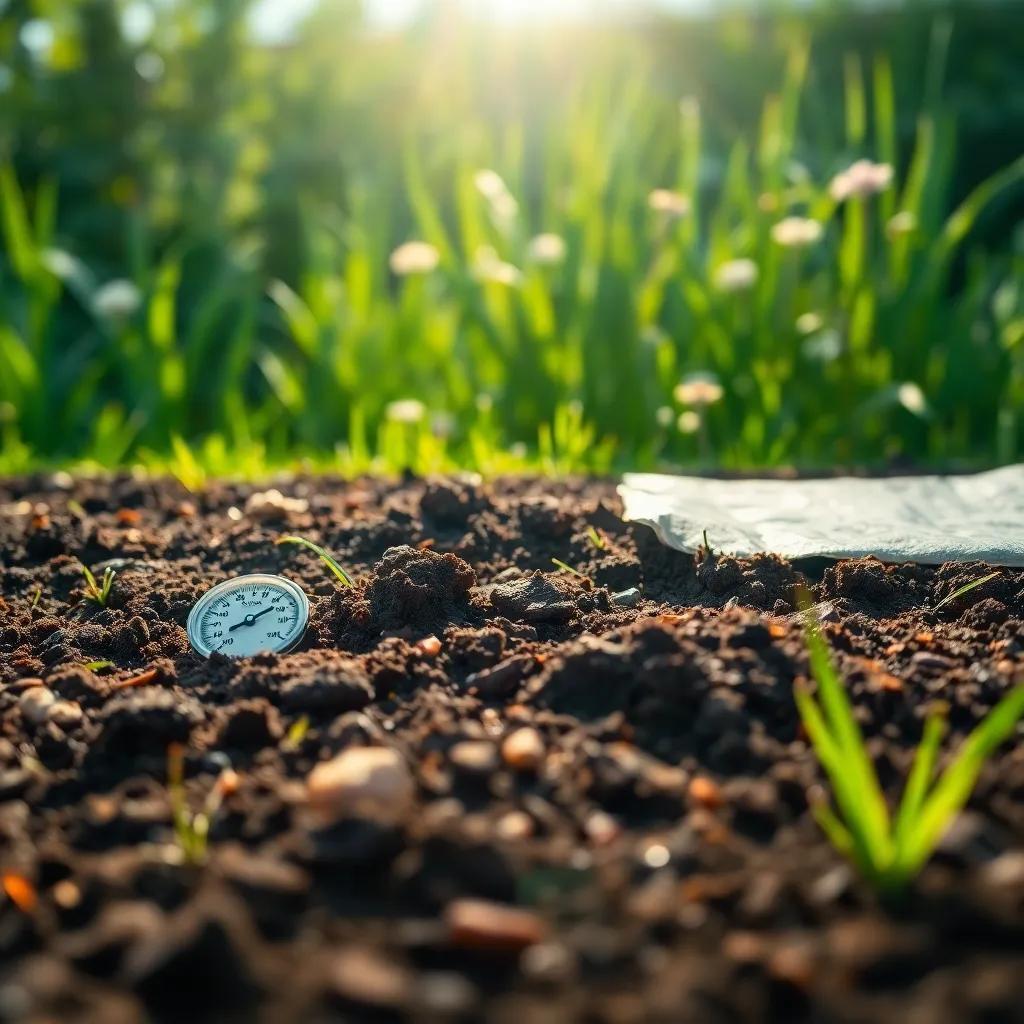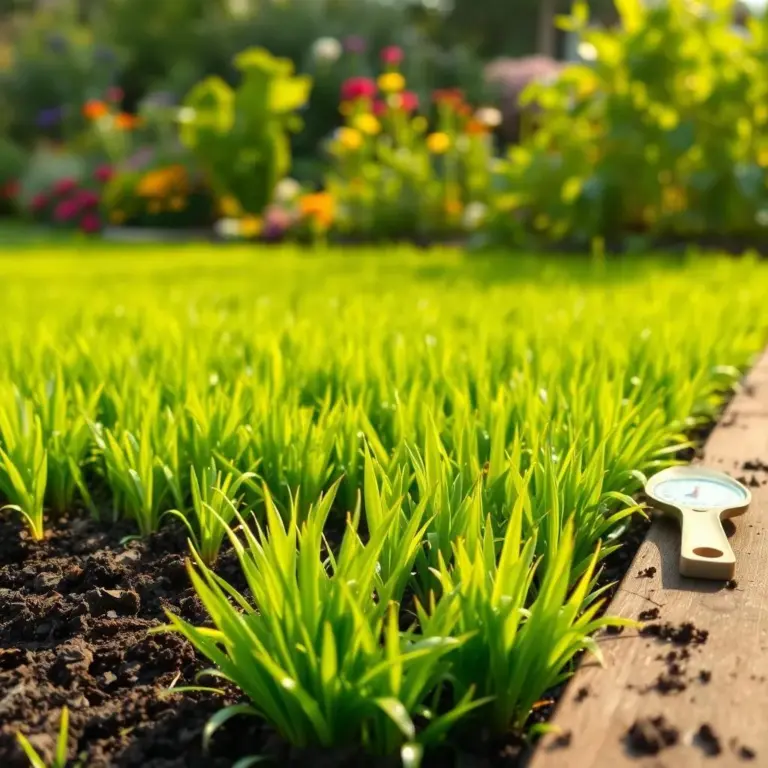Are you dreaming of a lush, green Bermuda grass lawn that’s the envy of the neighborhood? I get it! Growing grass from seeds might seem tricky, but once you know the secrets to germination, it can be a fun and rewarding journey. Join me as we explore how to cultivate that perfect lawn, from understanding germination times to avoiding common mistakes!
Factors Influencing Bermuda Grass Germination Time
When it comes to Bermuda grass, several factors can affect how quickly those little seeds sprout into beautiful green blades! Understanding these elements can make your gardening experience smoother and more enjoyable. So, what should I keep in mind? Let’s break it down!
- Temperature: The warmth of the soil is super important! For Bermuda grass, the temperature needs to be between 75°F and 85°F (24°C to 29°C). If it’s too cold, the seeds might just sit there, feeling lazy. Too hot? They might call it quits! It’s like trying to bake cookies in a cold oven; it just doesn’t work!
- Moisture: Seeds need water, but not too much! Keeping the soil consistently moist is key. Think of it as giving your seeds a cozy drink, but don’t drown them! A little sprinkle here and there is perfect—just enough to keep them happy.
- Light Exposure: Just like us, seeds love a bit of sunshine! Bermuda grass thrives in sunlight. If they’re stuck in shady spots, they’ll take their sweet time to germinate. Make sure they get some rays to help them grow strong and healthy!
- Soil Quality: The dirt matters! Quality soil that drains well, is loose, and has nutrients is a great cozy bed for seeds. If your soil is compacted or lacks nutrition, those seeds might struggle to break ground.
- Seed Quality: Fresh, viable seeds are the best! Out of date or poor-quality seeds? They just won’t perform well. Check the packet for the expiration date, and invest in good seeds to get the best results.
By keeping these factors in mind, you’ll create an environment that’s just right for your Bermuda grass seeds to grow and flourish! Happy planting!
Creating Optimal Conditions for Germination
Alright, now that we know what factors to keep an eye on, let’s talk about how to create the ideal conditions for our Bermuda grass seeds! Think of this as setting up a cozy little home for your plants. Here’s how to do it:
- Soil Temperature: Aim for that sweet spot of 75°F to 85°F. You can check the temperature using a soil thermometer. If it’s too cool, consider covering the area with black plastic to warm things up a bit. Who knew soil could get chilly, right?
- Moisture Management: Keeping the soil moist is key! Before planting, make sure the soil is evenly damp. Once you’ve sown the seeds, water lightly. It’s like giving your seeds a gentle shower. No one likes a flood!
- Light Exposure: Make sure your seeds get plenty of light! If you’re planting indoors, set them by a bright window or use grow lights. Outdoors? Find a sunny spot! Just remember, the more sunlight, the faster they grow!
- Soil Preparation: Take the time to prepare the soil! Remove any debris, rocks, or weeds. Loosen the soil and mix in some organic matter like compost. This helps with drainage and provides nutrients—like a delicious buffet for your seeds!
- Protection from Pests: Don’t forget to keep your area safe from hungry birds and other critters. Use bird netting or a light layer of straw to protect those precious seeds. It’s like hiring security for your garden!
By following these tips, you’ll create a welcoming environment for your Bermuda grass seeds. They’ll germinate all the faster and grow into a lush lawn! Happy gardening!

Typical Germination Period for Bermuda Grass Seeds
So, how long does it really take for Bermuda grass seeds to make their grand debut? Well, typically, you can expect those eager little seeds to sprout in about 7 to 21 days! That’s right, it’s not a race but rather a fun waiting game. Just like when I bake cookies, sometimes they take a bit longer than expected!
During this germination period, seeds go through some exciting changes. They soak up moisture, expand, and finally crack open! It’s like they’re waking up from a cozy nap. Once they break through the soil, the roots start to dig deep, anchoring the seedlings. At the same time, you’ll see the tiny shoots popping up towards the sunlight—talk about ambitious little greens!
Keep in mind, not all seeds sprout at the same time. Some might be early risers, while others may take a bit longer! Here’s a quick breakdown of what factors can affect the germination timing:
- Soil Temperature: Warmer soil means faster germination!
- Moisture Levels: Consistent moisture is key. Too dry or too wet can delay sprouting.
- Seed Quality: Fresh seeds are more likely to sprout sooner!
If you find that it’s taking longer than three weeks, it might be time to check on those environmental factors. Remember, patience is key, and soon enough, you’ll have a beautiful Bermuda grass lawn to enjoy!
Tips to Accelerate Bermuda Grass Seed Germination
Waiting for Bermuda grass seeds to sprout can feel like watching paint dry! But fear not, there are several tips and tricks I’ve picked up to help speed up the germination process. Think of it as giving your seeds a little extra motivation! Here’s how to kick things into gear:
- Pre-Germination: Soak your seeds in warm water for 24 to 48 hours before planting. This helps soften that hard seed coat and gets them ready for action!
- Scarification: Gently scratch the surface of the seeds with sandpaper to help them absorb water quicker. It’s like giving them a little pep talk!
- Maintain Ideal Soil Temperature: Keep that soil cozy! Use a thermometer to make sure it’s between 75°F and 85°F. If the soil is too cool, consider using black plastic to warm it up.
- Moisture Management: Keep the soil evenly moist by watering lightly and frequently. A mulch layer can help retain moisture—just like a comfy blanket for those seeds!
- Proper Seeding Depth: Plant your seeds at a depth of 1/4 to 1/2 inch. This helps make sure they stay in touch with the soil, which is vital for germination.
- Starter Fertilizer: Consider using a balanced starter fertilizer for that extra boost of nutrients! Just be cautious—too much can harm the seedlings.
By following these tips, you’ll be well on your way to a lush Bermuda grass lawn in no time! It’s all about creating the right conditions and giving those seeds the best chance to thrive!
Common Mistakes That Delay Germination
Sometimes, I think I know the secret to growing grass, only to trip over a few common mistakes that can really slow down the process! Let’s explore the slip-ups that can hold back our eager Bermuda grass seeds from sprouting!
- Insufficient Watering: Seeds need water—plain and simple! Not watering enough can dry out the seeds. Keep the soil consistently moist, but don’t drown them! You want a gentle sprinkle, not a flood.
- Overwatering: On the flip side, drowning the seeds is just as bad! Too much moisture can lead to rot and mold, which is a big no-no. Let the soil dry a bit between watering sessions!
- Wrong Timing: Planting Bermuda grass when the soil is too cold or too hot can throw a wrench in the works. Make sure you keep an eye on the temperature before seeding.
- Poor Soil Preparation: Skipping soil prep is like baking without measuring! Make sure the soil is well-drained and nutrient-rich. Remove rocks, debris, and weeds to give your seeds a fighting chance.
- Inadequate Seed Depth: Planting seeds too deep or too shallow can confuse them. Stick to the recommended depth of 1/4 to 1/2 inch for the best results.
- Neglecting Weed Control: Weeds can steal the show, competing for resources! Make sure to remove any existing weeds before planting to give your seeds room to grow.
- Not Protecting the Area: Without protection, birds and other critters can easily snack on your freshly sown seeds. Use bird netting or other barriers to keep them safe!
By avoiding these common mistakes, you can create the perfect environment for your Bermuda grass seeds to thrive! With a little patience and care, you’ll soon enjoy a vibrant, green lawn that will have your neighbors envious! Happy gardening!

